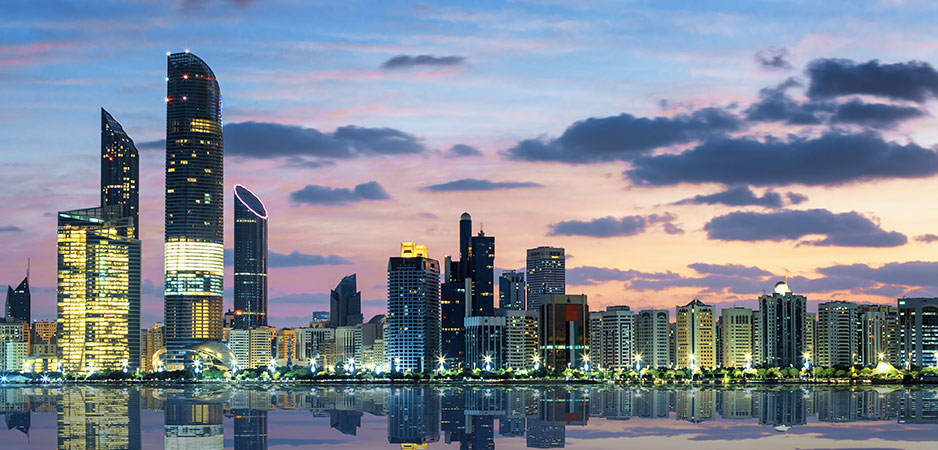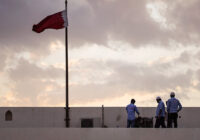While one should not leap to conclusions too hastily, there are some interesting parallels between what is happening now in Yemen and what happened a little over a year ago in Libya. In both countries, efforts at peace talks have been upturned by events on the ground. And while it is also true that one should not put too much emphasis on coincidence, it is a fact that in both cases, those doing the upending are backed by the Abu Dhabi crown prince and de facto leader of the United Arab Emirates, Mohammed bin Zayed, otherwise known as MBZ.
First to Libya. On April 4, 2019, the UAE-backed warlord Khalifa Haftar launched an offensive with his self-styled Libyan National Army (LNA) aimed at seizing the capital Tripoli from the internationally recognized Government of National Accord (GNA), led by Fayez al-Sarraj. That was just 10 days before the two sides were due to meet in United Nations-sponsored talks organized by Ghassan Salamé, the UN special representative. Haftar may well have been buoyed by a telephone conversation with US President Donald Trump, but his chief backer supplying the air support for his ground troops was — and remains, as the war drags on one year later — the UAE.
The GNA, backed by Turkey, has until recently had limited success other than holding a defensive line against Haftar’s troops, a mix of mercenaries (of which the most effective ones are Russian), militias and remnants of the forces from the overthrown regime of Muammar Gaddafi.
Marked Change
But now, with significant military support from Turkey, the GNA is clearly on the offensive, a marked change from nearly a year of hunkering down in defensive positions around the capital. Haftar’s forces have suffered significant defeats from mid-April on, losing control of seven towns northwest of Tripoli. Among them are three strategic coastal cities — Sabratha, Surman and al-Ajaylat — located between Tripoli and the Tunisian border. Haftar’s response was to launch multiple rocket attacks on the capital, with residents reporting explosion after explosion amidst an atmosphere of fear and panic.
With the United States using its UN Security Council vote to veto the Algerian Ramtane Lamamra, Salamé’s successor as envoy, the peace process, at least for now, is effectively dead. Despite the fact that 14 of the 15 UNSC members quickly voted for the experienced and respected Lamamra, the Americans, responding to pressure from the UAE and Egypt — Haftar’s other key regional backer — nixed the appointment.
Business Is Brisk in MENA Arms Trade
And so to Yemen. On April 23, the Saudi-led coalition announced a one-month extension of the two-week unilateral ceasefire declared earlier in April, despite the fact that the Houthis, the Saudis say, have consistently violated the ceasefire. The Houthis counter with the claim that it is the coalition that is in violation. (It does seem, however, that the Houthis are the ones most responsible for violations.)
How curious, then, that just two days later the secessionist Southern Transitional Council (STC), heavily backed by the UAE, announced a declaration of “self-administration” for the south’s governorates, including the strategic island of Socotra. The announcement was made by the STC in Abu Dhabi, where the leadership is based. That appears to have caught the Saudis and Prince Khalid bin Salman off guard.
Overplayed Hand
The younger brother of Saudi Crown Prince Mohammed bin Salman (MBS) has been assigned the daunting task of extricating the kingdom from a war that MBS had expected to win in a few weeks back in March 2015. Now, more than five years on, Saudi Arabia is desperate to find a way out of a reckless venture that has cost it hundreds of billions of dollars and huge global reputational damage. The reputational damage is thanks largely to an indiscriminate bombing campaign that has destroyed much of Yemen’s infrastructure, killed and wounded tens of thousands of civilians and helped to put most of the country’s 29 million people at risk of starvation or death from preventable diseases such as cholera.
It is ironic that the Emiratis, who went into the war with the Saudis and prosecuted it in the south, have since last summer withdrawn their ground forces while escaping with little reputational damage for their own excesses. For Khalid bin Salman and the carefully built Riyadh Agreement, which was supposed to bring various elements from the south together with the internationally recognized government of President Abd-Rabbu Mansour Hadi, the irony is a bitter one — and even more so for his brother, the crown prince.
In a tweet on April 27, Khalid described the decision as “surprising” and called, rather forlornly one suspects, for “returning to implement the Riyadh Agreement and its support for the legitimate (Hadi) government.”
It may be that in Yemen, both MBZ and the STC have rather overplayed their hand, with the majority of the southern governorates rejecting the declaration almost as soon as it was released. But in the game to create a pliable client state in the south, with the port of Aden as its capital — in effect a return to the pre-1990 arrangement but with the crucial distinction that it will be the UAE pulling the strings — MBZ is far ahead of MBS, who is mired in an unwinnable war in the north that the STC declaration has made all the more entangled and difficult for the Saudis to escape from.
And in Libya, though Haftar is on the back foot, there is no indication that MBZ is about to cut him loose. Rather the opposite, as the ECFR’s Tarek Megerisi noted in an Arab Digest podcast, bin Zayed’s “support for Haftar does not wane. In fact, it gets stronger and stronger.” Megerisi puts that down to three factors. First, the Emiratis have committed too much to Haftar to back out now. Second, they are prepared to take a few lumps because they believe that ultimately, their man will prevail. And, finally, with the way Haftar works, there are no obvious replacements.
Underlining the point that the UAE has the warlord’s back was Haftar’s April 27 announcement that he was accepting a “popular mandate” and announcing “that the general command is answering the will of the people, despite the heavy burden and the many obligations and the size of the responsibility” and despite, apparently, his heavy battlefield losses. It was a statement that was most unlikely to have been made without the knowledge and approval of bin Zayed. It bears an uncanny resemblance to the STC’s April 25 declaration of “self-administration.”
As he plays out his strategies, the crown prince of Abu Dhabi may well believe that keeping Yemen and Libya in a state of ongoing war suits both a broader geopolitical agenda and his cleverly understated, but nonetheless powerful, ambition to turn the UAE — a collection of small Gulf emirates — into a regional powerhouse with himself emerging as de facto leader of the Arab world.
The views expressed in this article are the author’s own and do not necessarily reflect Fair Observer’s editorial policy.
Support Fair Observer
We rely on your support for our independence, diversity and quality.
For more than 10 years, Fair Observer has been free, fair and independent. No billionaire owns us, no advertisers control us. We are a reader-supported nonprofit. Unlike many other publications, we keep our content free for readers regardless of where they live or whether they can afford to pay. We have no paywalls and no ads.
In the post-truth era of fake news, echo chambers and filter bubbles, we publish a plurality of perspectives from around the world. Anyone can publish with us, but everyone goes through a rigorous editorial process. So, you get fact-checked, well-reasoned content instead of noise.
We publish 2,500+ voices from 90+ countries. We also conduct education and training programs
on subjects ranging from digital media and journalism to writing and critical thinking. This
doesn’t come cheap. Servers, editors, trainers and web developers cost
money.
Please consider supporting us on a regular basis as a recurring donor or a
sustaining member.
Will you support FO’s journalism?
We rely on your support for our independence, diversity and quality.






